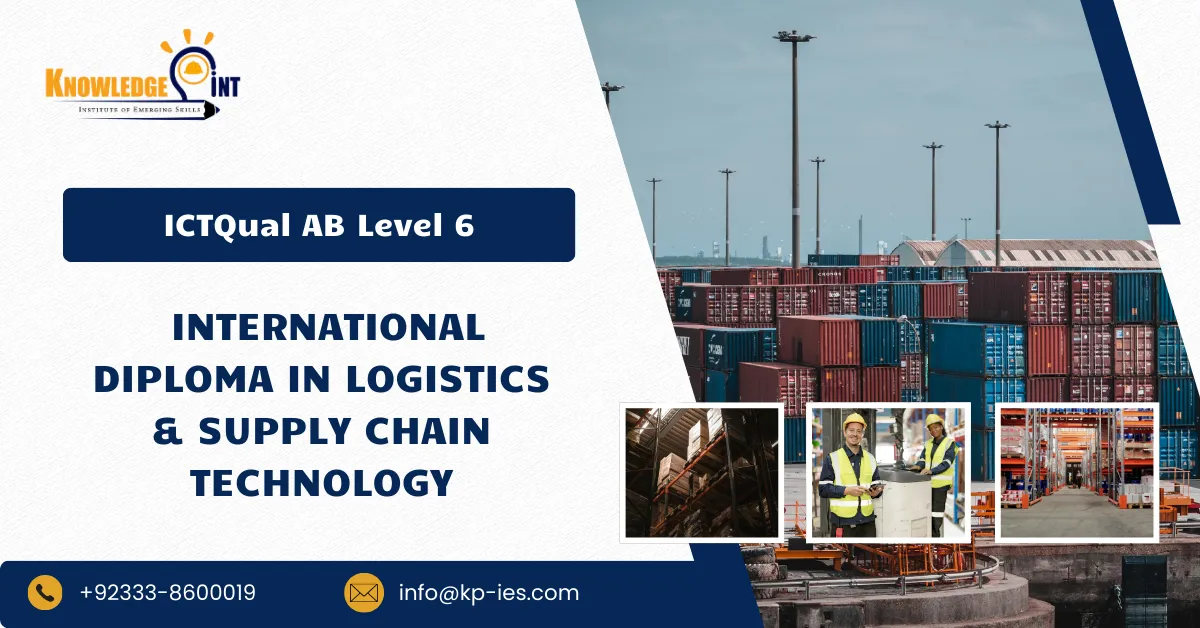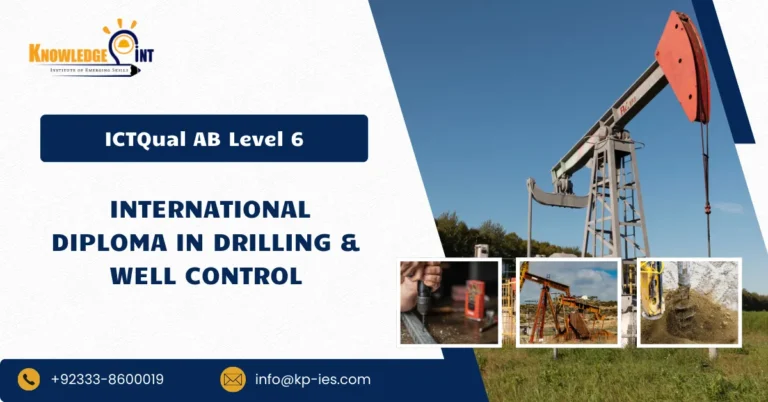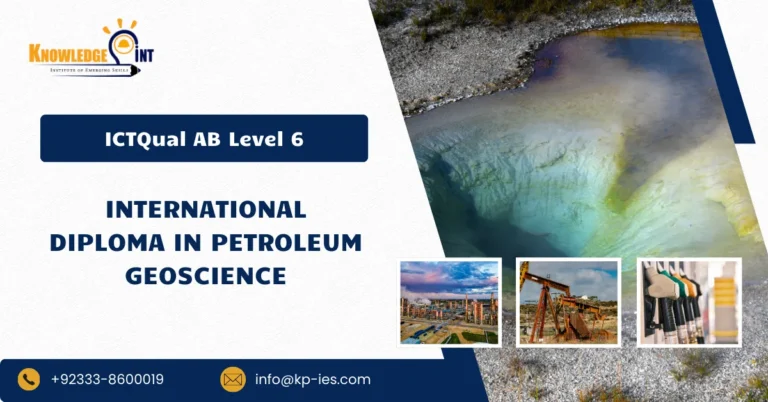The ICTQual AB Level 6 International Diploma in Logistics & Supply Chain Technology is an advanced three-year, 360-credit programme designed to equip learners with the technical expertise, operational knowledge, and strategic leadership skills required to excel in the dynamic field of supply chain management. This programme provides a comprehensive understanding of modern supply chain systems, logistics operations, procurement strategies, inventory management, and technology-driven optimisation processes.
Learners will develop the ability to analyse, design, and implement efficient logistics solutions, ensuring the seamless movement of goods, services, and information across global supply chains. The curriculum integrates theoretical foundations with practical applications, including case studies, operational simulations, research projects, and applied assignments, enabling learners to tackle real-world challenges in logistics and supply chain operations.
The Supply chain operations programme is tailored for both fresh learners and experienced professionals. Fresh learners will gain a strong foundation in supply chain principles, transport coordination, procurement, and operational management, gradually progressing to advanced strategic and analytical skills. Experienced professionals can leverage their industry experience to deepen leadership capabilities, optimise operations, and implement innovative solutions within their organisations.
Course Overview
This qualification, the ICTQual AB Level 6 International Diploma in Logistics & Supply Chain Technology, consists of 36 mandatory units.
Year 1 – Foundations of Logistics & Supply Chain
- Introduction to Logistics and Supply Chain Management
- Principles of Transport and Distribution
- Inventory Management and Control Systems
- Procurement and Supplier Management
- Basics of Warehouse Operations
- Supply Chain Economics and Policy
- Fundamentals of Risk Management in Logistics
- Business Communication and Professional Ethics
- Introduction to Global Trade and Regulations
- Sustainability and Environmental Management in Supply Chains
- Information Systems in Logistics
- Introduction to Project Management
Year 2 – Applied Logistics Operations & Management
- Advanced Supply Chain Planning and Scheduling
- Freight and Transportation Management
- Procurement Strategy and Supplier Evaluation
- Warehouse and Inventory Optimisation Techniques
- Logistics Technology and Digitalisation
- Safety, Compliance, and Risk Mitigation in Operations
- Logistics Performance Measurement and KPIs
- Lean and Six Sigma Applications in Supply Chains
- Global Logistics and International Trade Management
- Human Resource and Team Management in Logistics
- Applied Case Studies in Supply Chain Management
- Simulation Exercises in Logistics Operations
Year 3 – Strategic Leadership & Advanced Supply Chain Management
- Strategic Supply Chain Management
- Leadership and Decision-Making in Logistics
- Advanced Procurement and Contract Management
- Global Supply Chain Integration and Coordination
- Transport Network Design and Optimisation
- Risk Management and Crisis Response in Supply Chains
- Sustainability, Circular Economy, and Green Logistics
- Emerging Technologies and Innovation in Supply Chains
- Data Analysis and Research Methods for Logistics
- Independent Research Project in Logistics & Supply Chain
- Capstone Project: Applied Strategic Supply Chain Management
- Performance Audit and Continuous Improvement Strategies
Learning Outcomes for the ICTQual AB Level 6 International Diploma in Logistics & Supply Chain Technology 360 Credits – Three Years:
Year 1 – Foundations of Logistics & Supply Chain
1. Introduction to Logistics and Supply Chain Management
- Explain the core concepts, structure, and functions of modern supply chains.
- Analyse the roles of key stakeholders in domestic and global supply chains.
2. Principles of Transport and Distribution
- Describe transport modes, distribution networks, and operational principles.
- Apply fundamental planning techniques to ensure timely and cost-effective delivery.
3. Inventory Management and Control Systems
- Understand inventory types, control methods, and stock optimisation techniques.
- Implement basic inventory management systems to improve efficiency.
4. Procurement and Supplier Management
- Explain procurement processes and supplier selection criteria.
- Evaluate supplier performance and ensure alignment with organisational goals.
5. Basics of Warehouse Operations
- Understand warehouse design, layout, and workflow.
- Apply storage, handling, and safety principles to maintain efficient operations.
6. Supply Chain Economics and Policy
- Analyse economic principles affecting Distribution management decisions.
- Understand the impact of policies, regulations, and global trade on operations.
7. Fundamentals of Risk Management in Logistics
- Identify common risks in warehousing and supply chain operations.
- Apply basic risk assessment and mitigation strategies.
8. Business Communication and Professional Ethics
- Demonstrate effective communication in professional logistics contexts.
- Apply ethical principles to decision-making and operational practices.
9. Introduction to Global Trade and Regulations
- Understand international trade agreements, import/export regulations, and customs procedures.
- Apply compliance principles to cross-border supply chain activities.
10. Sustainability and Environmental Management in Supply Chains
- Analyse environmental impacts of logistics operations.
- Propose strategies to promote sustainable and green supply chain practices.
11. Information Systems in Logistics
- Understand the role of IT and digital systems in supply chain management.
- Apply basic logistics software to track, monitor, and optimise operations.
12. Introduction to Project Management
- Describe project management principles and lifecycle stages.
- Apply foundational tools for planning, monitoring, and controlling supply chain projects.
Year 2 – Applied Logistics Operations & Management
1. Advanced Supply Chain Planning and Scheduling
- Develop operational plans to optimise supply chain efficiency.
- Apply advanced scheduling techniques for transport and inventory management.
2. Freight and Transportation Management
- Manage freight operations, including mode selection and route optimisation.
- Apply regulatory compliance and safety standards in transportation.
3. Procurement Strategy and Supplier Evaluation
- Design procurement strategies aligned with organisational goals.
- Evaluate supplier performance using quantitative and qualitative metrics.
4. Warehouse and Inventory Optimisation Techniques
- Apply lean and just-in-time techniques to optimise storage and handling.
- Analyse warehouse processes for efficiency improvements.
5. Logistics Technology and Digitalisation
- Evaluate emerging digital technologies in logistics, including automation and AI.
- Implement digital solutions to enhance operational performance.
6. Safety, Compliance, and Risk Mitigation in Operations
- Develop risk mitigation plans for operational hazards.
- Ensure compliance with safety regulations in logistics operations.
7. Logistics Performance Measurement and KPIs
- Identify key performance indicators (KPIs) for supply chain operations.
- Analyse performance data to inform operational improvements.
8. Lean and Six Sigma Applications in Supply Chains
- Apply Lean and Six Sigma methodologies to improve efficiency and reduce waste.
- Monitor and control process improvements using established metrics.
9. Global Logistics and International Trade Management
- Manage supply chains across international borders.
- Apply trade compliance, documentation, and logistics coordination best practices.
10. Human Resource and Team Management in Logistics
- Manage teams within logistics and supply chain operations.
- Apply leadership and motivational techniques to improve workforce productivity.
11. Applied Case Studies in Supply Chain Management
- Analyse real-world scenarios to solve logistical challenges.
- Apply theoretical knowledge to develop practical solutions.
12. Simulation Exercises in Logistics Operations
- Participate in simulated logistics environments.
- Apply operational planning, risk management, and decision-making skills in practice.
Year 3 – Strategic Leadership & Advanced Supply Chain Management
1. Strategic Supply Chain Management
- Develop strategies for integrated, efficient, and resilient supply chains.
- Analyse competitive and global factors influencing strategic decisions.
2. Leadership and Decision-Making in Logistics
- Apply leadership models to drive team and organisational performance.
- Make strategic decisions in complex and dynamic logistics environments.
3. Advanced Procurement and Contract Management
- Design and manage complex procurement contracts and negotiations.
- Ensure compliance with legal, ethical, and operational requirements.
4. Global Supply Chain Integration and Coordination
- Integrate multi-modal and cross-border supply chains.
- Optimise processes for efficiency, cost reduction, and service reliability.
5. Transport Network Design and Optimisation
- Analyse and design efficient transport and distribution networks.
- Apply optimisation techniques for routing, scheduling, and capacity management.
6. Risk Management and Crisis Response in Supply Chains
- Develop comprehensive risk and crisis management strategies.
- Implement contingency plans to maintain continuity of supply.
7. Sustainability, Circular Economy, and Green Logistics
- Promote sustainable practices, including waste reduction and circular economy principles.
- Implement green logistics solutions to reduce environmental impact.
8. Emerging Technologies and Innovation in Supply Chains
- Evaluate innovative technologies including AI, IoT, and blockchain in logistics.
- Apply technological solutions to enhance operational efficiency and decision-making.
9. Data Analysis and Research Methods for Logistics
- Apply quantitative and qualitative research methods in logistics & supply chain technology.
- Analyse data to support evidence-based strategic decisions.
10. Independent Research Project in Logistics & Supply Chain
- Conduct independent research on a relevant logistics problem.
- Present findings with actionable recommendations for industry application.
11. Capstone Project: Applied Strategic Supply Chain Management
- Integrate learning from all study units into a comprehensive applied project.
- Demonstrate strategic planning, leadership, and operational management skills.
12. Performance Audit and Continuous Improvement Strategies
- Conduct audits of supply chain operations to identify inefficiencies.
- Propose continuous improvement strategies aligned with organisational objectives.
Course Benefits of ICTQual AB Level 6 International Diploma in Logistics & Supply Chain Technology
- Provides comprehensive knowledge of logistics, supply chain management, and operational strategies.
- Equips learners with skills in procurement, inventory management, transportation, and warehouse operations.
- Develops expertise in supply chain optimization, demand forecasting, and global logistics networks.
- Enhances understanding of international trade regulations, quality standards, and compliance requirements.
- Offers practical experience through case studies, simulations, and real-world supply chain projects.
- Strengthens problem-solving, analytical, and decision-making skills in logistics and supply chain operations.
- Prepares learners for leadership and managerial roles in supply chain, logistics, and procurement departments.
- Improves employability in manufacturing, retail, e-commerce, shipping, and logistics consultancy sectors.
- Promotes adherence to ethical practices, sustainability, and risk management in supply chain operations.
- Supports continuous professional development and specialization in advanced logistics and supply chain technologies.
After completing this course, learners can progress in the following ways:
- Pursue Master’s degrees in Logistics, Supply Chain Management, Operations Management, or International Business.
- Obtain professional certifications such as Certified Supply Chain Professional (CSCP), Chartered Logistics & Transport (CILT), or Lean Six Sigma Certification.
- Advance into senior roles such as Supply Chain Manager, Logistics Operations Manager, Procurement Specialist, or Inventory Control Manager.
- Work with manufacturing companies, retail firms, e-commerce businesses, shipping companies, and logistics consultancies.
- Progress into leadership and executive positions, overseeing global supply chain operations, logistics strategies, and procurement processes.
- Engage in research and innovation, improving supply chain efficiency, sustainability, and digital transformation initiatives.
- Transition into specialized areas such as cold chain logistics, e-commerce logistics, freight forwarding, or supply chain analytics.







